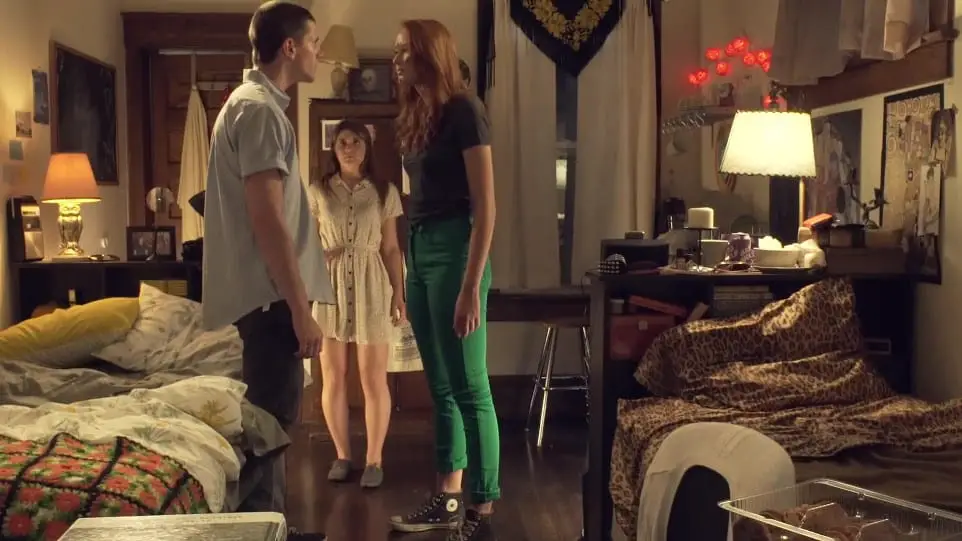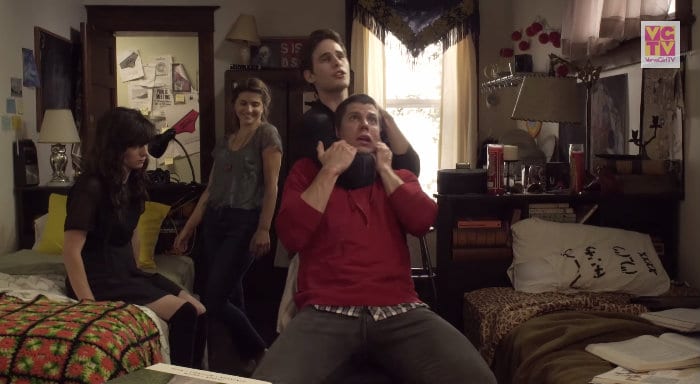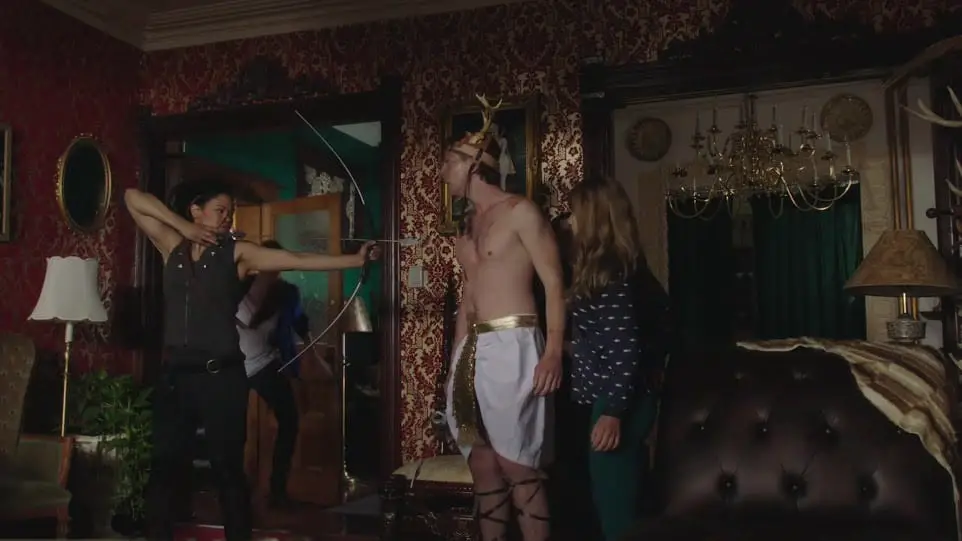A healthy portray of masculinity probably isn’t the first thing that comes to mind when one thinks of Carmilla and Kirsch definitely isn’t the first character you’ll think of amongst the abundance of fun and diverse characters populating the cast. It’s easy to overlook Wilson Kirsch as just the frat boy comic relief of the Carmilla series. He’s a playful twist on the notion of tokenism as one of the few male characters in the series and the only one who’s present from beginning to end. In the movie, he’s the only the guy to appear, period, including background extras. But Kirsch is much more than the token guy. He’s shaped by his perception of masculinity. At the start, he comes bearing some dangerous aspects associated with masculinity, wearing them like gilded armour. As the series goes on that perception shifts. As he gains and loses relationships he allows himself to drop the façade and let his true personality shine through.
The Loveable Frat Boy
When we’re first introduced to Kirsch he hits every checkbox a frat boy could hit. He loves drinking, partying with his bros and hitting on women. He’s tall, intimidating and quick to fight. He’s loveably clueless, so much so it’s a wonder how he got into university at all, even one as dubious as Silas. He is the paradigm of the stereotypical ‘dumb jock’.

From the moment he walks into Laura’s dorm he brandishes the finer elements of toxic masculinity like a badge. With girls on campus going missing he sees the Zeta’s as the best people to protect them. Naturally, there’s no one better for the job, at least that’s what he thinks. Never mind Laura is obviously unconformable when he and Will make their way into her dorm. They’re there to protect her, so that makes it cool.
But as we spend more time with him his true nature begins to shine through. He’s someone with a kind and sensitive side. He deeply cares for those close to him, guy or girl. Kirsch chose to become Laura’s ‘dudescort’ because they have a literature class together. He even brings her things he thinks she’ll like. When Laura asks him to stop using the word hottie and he does, even if his substitute of ‘sexy lady’ isn’t much better. When they start to piece together the mystery he’s resistant to the truth at first. But realizing his girlfriend’s behaviour isn’t just party fuelled vigour he reaches out for help.
After her death, he does genuinely grieve for Sara Jane, even if he does his best not to show it. He holds a memorial for her, carries flowers to her grave. When confronted with the fact Will is an evil vampire, he refuses to believe that his friend would ever hurt him.
That bravado he carried was a mask, one he felt he needed to wear. That was what made him a Zeta brother. Even before he starts to show change, just comparing him to the other Zetas highlights the difference between them and him.
He’s Better than Your Average Guy
Or, at least he’s better than other men present in Carmilla. Will and Theo are atrocious by comparison. They’re both in it for themselves, each trying to reach a higher level of power and respect. Will, a younger vampire, is threatened by the position others, like Carmilla, hold with the Dean, their Mother. He’ll do anything to please the Dean, even selling out the friend who refused to believe Will would hurt him.

Theo’s even worse. As the president of the Zeta’s he’s obsessed with the fraternity’s position in Silas’ hierarchy. He feels like the Zeta’s have fallen from grace, from their place at the top of Silas. This fuels his rivalry with other student associations like the Alchemy Club and especially with the Summer Society. Theo’s so desperate in his power grab that he sides with someone he believes is insane, betraying everybody else. A decision that cost lives, including the life of Danny Lawrence, who Theo kills himself.
Theo and Kirsch throughout the second season are foils for each other. Theo is resistant to every attempt of co-operation with the others and Kirsch becomes the voice that pushes the Zeta’s to teamwork. Kirsch has moved past the mentality that has the men they should be the protectors. After all, only by working together did they manage to defeat the vampires.
The second season brings with it much growth for Kirsch. He’s allowing himself to be open and expressive. With Laura and the rest of the Scoobies running a murder investigation where they’re all suspects, he becomes a representative along with Danny to ensure an unbiased investigation. He’s the one who suggests the idea, which is a far cry from the Zeta’s usual reaction of grabbing tridents and salted fish.
One of the biggest moments for Kirsch is when he divorces himself from Theo and by the extension, the Zeta’s. Admits the chaos of the Zeta’s betray it’s clear he had no idea it was coming. He’s as shaken by the turn of events as anyone. Especially by Danny’s death. He denounced Theo as a brother. Brotherhood is one of the defying traits of the Zeta’s and he denounces himself from it because he can’t side with them after their betrayal. In a way, he denounces part of his masculinity he’s held onto until now.
Kirsch has no Time for your Misogynistic Tropes
Speaking of Kirsch and Danny, their relationship becomes one of the best the series has to offer. When Kirsch develops a crush it seems destined that he’ll be left heartbroken in the ‘friend-zone’. But Wilson Kirsch shows no pain upon learning he is in the friend-zone. He’s excited by the fact Danny sees him as a friend. He’s honest with his feelings and that he wished there could be more. But he understands.
“I get it. You’re not into me that way.”
– Wilson Kirsch, with the most refreshing reaction to being friendzoned.
Later on, his friendship with Danny becomes the catalyst that pulls her back from the dark side. A friendship that remains a friendship when a lesser series would have ‘rewarded’ Kirsch with romance.
Also, he never tries to undermine her or any of the other characters, yet another way Kirsch breaks the standard conventions of fiction. As a guy surrounded by so many women, it would have been all too easy to make him feel out of place. But that’s never the case. It’s never even an issue. He never speaks over them. While he does let his voice be heard, it’s only after he’s listened to those around him. He is aware his friends are better equipped to make decisions than he is and he trusts their judgement. He’s shown to trust Laura, willing to follow her judgement implicitly. Something that not even Danny and Carmilla do right away.
The Old Meets New
Ironically, Kirsch has a lot in common with another male character in Carmilla, the Baron Vordenberg. The Baron sees his actions as chivalrous. He sees himself a protector. He rationalizes the unsultry things he does are for the greater good. Kirsch is also a protector. The similarities stem from aspects of Kirsch’s masculinity being drawn older expectations of masculinity, where attributes like protector or breadwinner were expected of men. Ultimately this is where their similarities also end, because as alike as they may seem their reasoning for their actions put them worlds apart.
As much as the Baron sees his actions as heroic, his motivations are selfish. He wants his name to be remembered. The man who rid Silas of the evil supernatural begins plaguing its campus. Which seems well and good until you realize he plans to root out the bad vampires and creatures by getting rid of every supernatural begin. Vordenberg is quick to talk of being the hero without actually placing himself on the front lines.
Kirsch, on the other hand, does what he does for the sake of his friends. This is where his masculinity steps into the modern age. He doesn’t want to protect his friends because he’s the guy in the group. He wants to protect them because he’s willing to protect anyone he cares about. When the time comes to fight he’s standing by their sides, ready to fight with them, not for them.

Kirsch, a Truly Good Guy
Yes, Wilson Kirsch is the simple, comic relief. He’s the token guy of the group. But he’s also someone with who deeply cares for his friends. He’s protective, kind and understanding. Once he allows himself to let go of the negative aspects of his masculinity he becomes the best version of himself.

